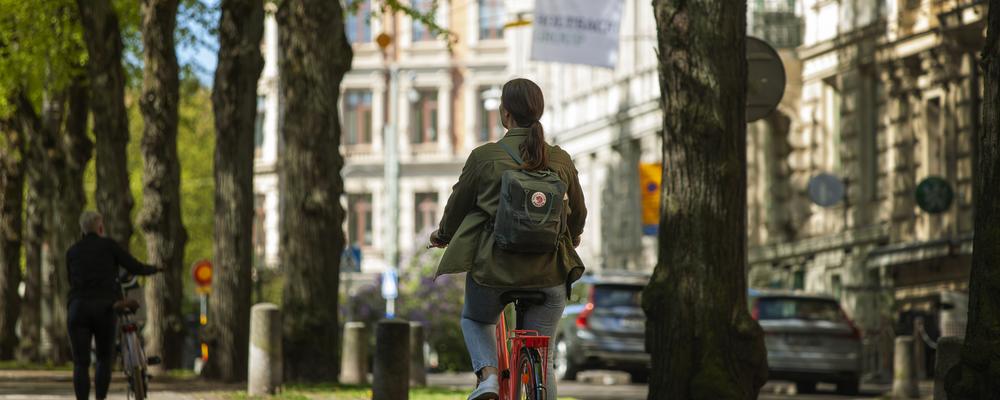
Sustainability results 2024
The sustainability report is an integral part of the 2024 University of Gothenburg Annual Report. The latest report was published in February 2024. Here, you can find a selection of the results.
A climate-neutral organisation in 2045
As an organization, the University of Gothenburg has a significant environmental impact, and we therefore have a great responsibility to develop our internal work for sustainable development. Our goal is to halve our carbon emissions by 2030, compared to 2019. Our long-term goal is to be climate-neutral by 2045, which aligns with Sweden's overall goal adopted by the Swedish Parliament.
In 2024, the university emitted 42.5 kilotons of carbon dioxide, a reduction of 8% compared to 2019. In 2024, carbon emissions decreased for the first time since the pandemic, with an 8% reduction compared to 2019. The largest contributing factor was reduced emissions from air travel, which decreased by over 18% compared to the baseline year. Emissions from short-haul flights decreased significantly during the pandemic and have remained at low levels since, while emissions from long-haul flights decreased in 2024. Train travel for work has increased by 17% since 2019, measured in kilometers. Train travel is the most environmentally friendly travel option and accounts for negligible carbon emissions.
What we did in 2024
CIS tool
To measure our carbon emissions, we have developed a digital tool, the Carbon Intelligence System, which displays carbon emissions per organisational unit. T
he tool allows university managers to follow and analyse the carbon emissions of their activities and operations.
Education
The University of Gothenburg has a unique opportunity to contribute to societal development through its role as an educator of future generations of citizens and decision-makers. By continuing to actively integrate sustainability perspectives into core operations, the university has the greatest opportunity to contribute positively to sustainable development. The university is tasked with educating for a sustainable future, and today's students expect sustainability to be adequately integrated into their education.
What we did in 2024
Research and collaboration
The University of Gothenburg strives to strengthen its role as a leading university in sustainable development. There is a need for increased competence and insight into how the transition to a sustainable society should take place, both nationally and globally. The university's research plays a key role in contributing scientifically built knowledge to this transition.
A total of 865 scientific publications on sustainable development were published in 2024, a 13% increase compared to 2023. The university's publications on sustainable development from 2020 to 2024 show a clear increase. The most prominent change concerns research review articles, which increased from 14 articles in 2020 to 55 articles in 2024. This sharp growth may reflect an increased complexity in sustainability challenges where interdisciplinary perspectives and knowledge syntheses are central to further research. The research is dominated by topics related to climate change, global challenges, health, and environmental pollution.
What we did in 2024
Procurement and purchasing
In the university's procurements and purchases, sustainability requirements are set for products and services. Suppliers are also required to have knowledge of sustainability. To ensure that our requirements are met, the university's procurement officers and purchasing coordinators are trained in sustainable development.
In 2024, the university set sustainability requirements in 90% of framework agreement procurements.
What we did in 2024
Energy and buildings
In 2024, the university's energy use for electricity and heating was 170 kilowatt-hours per square meter, a 5% decrease compared to 2023. Since 2019, energy usage has decreased by almost 17%.
Energy use has steadily decreased year by year, which is the result of long-term collaboration with property owners and continuous energy efficiency work in cooperation between the university and property owners. Some operations have also moved from old buildings to newly built energy-efficient premises, which has had a visible effect on the result.
What we did in 2024
Waste and recycling
In 2024, the university’s waste amounted to 819 tons, a decrease of 20 percent compared to 2023. Part of this reduction is due to the fact that 2023 saw relatively high waste volumes due to clear-outs related to relocation projects, particularly within the Faculty of Science.
What we did in 2024
Competence Development
Responsibility within the environmental management system follows the line organization, and ensuring that managers are aware of their responsibilities is essential for effective environmental management. The support structure, consisting of environmental coordinators at faculties and environmental representatives at departments, meets twice per semester for experience exchange, information sharing, and inspiration.
What we did in 2024
Methodological work for sustainable development
The University of Gothenburg is certified according to the international environmental management system standard ISO 14001, which entails continuous improvement efforts to reduce negative environmental impacts. At the same time, the positive impact on sustainable development is strengthened through education, research, and collaboration. Sustainable development is monitored qualitatively in faculty operational dialogues and annual follow-up reports, as well as quantitatively through indicators within the environmental management system and the climate framework.
The university leadership receives a comprehensive review of the environmental management system twice per year.
How the University Reports Its Sustainability Work
The University of Gothenburg’s Annual Report 2024 includes the sustainability report as an integrated section. The sustainability report is published annually, and results are presented in a way that allows for year-to-year comparisons wherever possible. Measurement data are derived from internal statistics as well as statistics from suppliers and contractors engaged by the university.
The University of Gothenburg reports the results of its environmental management efforts to the Ministry of Education and the Swedish Environmental Protection Agency in accordance with the Regulation (2009:907) on Environmental Management in Government Agencies and the Regulation (2014:480) on Government Agencies’ Procurement of Energy-Efficient Goods, Services, and Buildings.